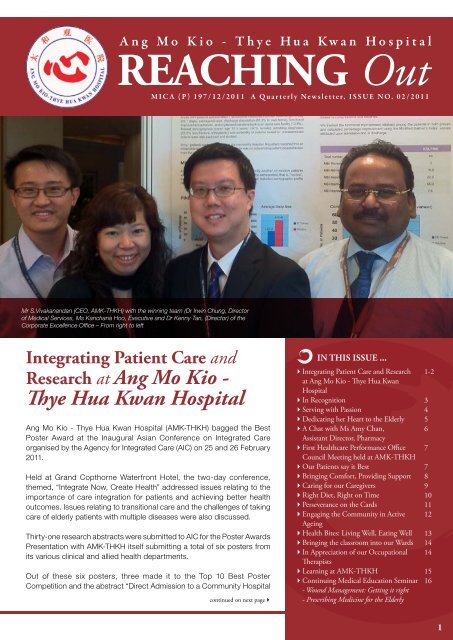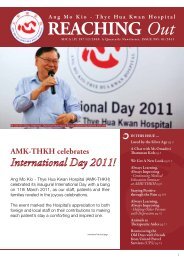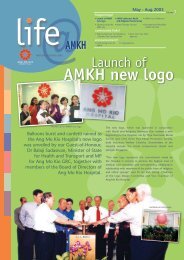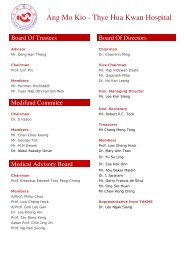AMK-THKH Newsletter Issue 2 of 2011 - Thye Hua Kwan Hospital
AMK-THKH Newsletter Issue 2 of 2011 - Thye Hua Kwan Hospital
AMK-THKH Newsletter Issue 2 of 2011 - Thye Hua Kwan Hospital
You also want an ePaper? Increase the reach of your titles
YUMPU automatically turns print PDFs into web optimized ePapers that Google loves.
ServingwithPassionWe managed to catch up and findout more about Ms Carolina Png,the new Deputy Director <strong>of</strong> AlliedHealth at <strong>AMK</strong>-<strong>THKH</strong>, as she settledinto her new role.She joins <strong>AMK</strong>-<strong>THKH</strong> from TanTock Seng <strong>Hospital</strong>, where she ledthe Cardiopulmonary PhysiotherapyUnit.She has always believed in hope inrehabilitation, sharing an anecdotefrom her past work experienceabout a patient who requiredmaximum support initially uponadmission to the hospital.Looking back at her career, shesingles out one particular mentor, aprevious supervisor, who gave hermuch support and opportunities togrow. “She was an open-mindedleader who welcomes contribution<strong>of</strong> ideas and opinions, whileencouraging us to be independent inmaking our own decisions.”As the Deputy Director <strong>of</strong> AlliedHealth in <strong>AMK</strong>-<strong>THKH</strong>, Ms Png aimsto integrate the various disciplinesunder her purview to providetheir best care in making sure thepatients’ transition from hospital tocommunity is a seamless one."My goal is toprovide a platformfor our patientsto receive the bestrehabilitation careand a chance for abetter quality<strong>of</strong> life."Ms Carolina Png,Deputy Director,Allied HealthDedicating her Heartto theStudying Biology during herSecondary education sparked <strong>of</strong>f DrJocelyn Koh’s passion to further studythe mystery <strong>of</strong> the human body. Thisbudding passion eventually led herto pursue Medicine at the NationalUniversity <strong>of</strong> Singapore.Nine years on, Dr Koh, who has beenseeing patients at polyclinics sinceshe completed her medical training,continues to care for the ill in thecommunity. This time, she decidedto take up the challenging task <strong>of</strong>caring for geriatric patients, joining the<strong>Hospital</strong> as a Registrar.ElderlyDr Koh identified Geriatrics asa core national need. With ourpatients getting more sophisticated,Dr Koh defined managingpatients’ higher expectations andaddressing their needs as areas <strong>of</strong>challenge.Apart from carrying out her routinerounds in the wards, Dr Koh believesin empowering her patients byeducating them on their medicalconditions and taking control <strong>of</strong> theirmedication intake.“The ultimate goal is to ensure patientsknow how to take their medicine aftertheir discharge and to monitor theirown medical conditions. This willhelp patients to be more independentwhen they integrate back into thesociety” said Dr Koh.“Many felt that that this patientposed limited rehabilitativepotential but I was not deterred. Amonth later, he walked out <strong>of</strong> thecentre on his own with a walkingstick after much-invested efforts ingetting him up and about.”In particular, she has a clear focuson the aging population, withits attendant implications. “Mygoal is to provide a platform forour patients to receive the bestrehabilitation care and a chancefor a better quality <strong>of</strong> life.”Dr Koh attendingto a patientMs Png with herphysiotherapistduring a therapysessionDr Jocelyn Koh,Registrar, <strong>AMK</strong>-<strong>THKH</strong><strong>AMK</strong> - <strong>THKH</strong> REACHING OUT 5
Ms Amy Chan,Serving our patients with a warm smileA Chat withMs Amy Chan<strong>AMK</strong>-<strong>THKH</strong> warmly welcomes MsAmy Chan to its senior leadership asAssistant Director <strong>of</strong> Pharmacy. MsChan brings with her more than adecade <strong>of</strong> pr<strong>of</strong>essional experience inthe Pharmacy field. She has workedin various sectors <strong>of</strong> the healthcareindustry ranging from primary totertiary healthcare institutions both inthe public and private sectors.I decided to become a pharmacistbecause…I have always wanted to care for thesick since young and this passion isstill burning bright within me.The most rewarding aspect <strong>of</strong> mywork is…When I am able to educate andempower my patients to consumetheir medication safely. This isimportant because an overdose canresult in serious consequences inpatients’ health.Patients and their caregivers mustunderstand how and when themedicine must be taken to optimiseresults.My day begins every morning at8.30am. Together with my team, Ireview the Inpatient Medical Records(IMR) after our doctors complete theirward rounds. This will be followed bystock-taking <strong>of</strong> patients’ medicationbefore lunchtime.In the afternoon, I conduct medicationscreening for patients who havejust been admitted to our <strong>Hospital</strong>.This involves reviewing patients’medication and ensuring that theirprescribed medicine is continued.Medication consultation is alsoprovided for patients who are due fordischarge the same day.My day ends with preparingmedications for patients who will bedischarged the next day.Working in a Community<strong>Hospital</strong>…Our patients typically spend about30 days with us. This allows me toeducate and counsel my patients in arelatively unhurried manner which isideal in a Community <strong>Hospital</strong> setting.This is especially true for patientswho are on various medications formultiple chronic conditions.I see joining <strong>AMK</strong>-<strong>THKH</strong> as…An opportunity to explore and learnabout step-down care in Singapore.Together with the multi-disciplinaryteam at <strong>AMK</strong>-<strong>THKH</strong>, we aim to nurseour patients back to good healthand return home equipped with bothknowledge and medical supplies totake care <strong>of</strong> their health.First HealthcarePerformance OfficeCouncil Meetingheld at <strong>AMK</strong>-<strong>THKH</strong>The Ministry <strong>of</strong> Health (MOH)Healthcare Performance Group hasinitiated the set-up <strong>of</strong> the HealthcarePerformance Offices (HPOs) inCommunity <strong>Hospital</strong>s (CHs). TheHPOs serve as the centre for collationand analysis <strong>of</strong> CHs’ performanceindicators.On 13 July <strong>2011</strong>, <strong>AMK</strong>-<strong>THKH</strong> hostedthe first Healthcare Performance Office(HPO) Council Meeting. The HPOCouncil Meeting provided a platformfor HPOs <strong>of</strong> various CHs to share andreview their methodology <strong>of</strong> collatingand analysing performance indicators.Our Patientssay itBestDear Doctors, Nurses and Staffat Ward 3 (East Wing),Thank you very much for yourcare and concern during my stayat the <strong>Hospital</strong>. Even though yourworkload was heavy; having to takecare <strong>of</strong> many patients at all times,you are always prompt and kindin providing me all the help that Ineeded.To all Staff <strong>of</strong> the <strong>Hospital</strong>,Thank you for taking such great care<strong>of</strong> Mr Edward Semily during his2-week stay. Your dedicated servicehas enabled us to manage and survivethrough our difficult situation.Best RegardsFrom the family <strong>of</strong> Mr EdwardSemilyI will always remember your kindnessand your spirit <strong>of</strong> giving! Thank youand best wishes to all.RegardsMdm Chong See Moi<strong>AMK</strong> - <strong>THKH</strong> REACHING OUT 7
Our participants engaging in a friendly chatCaring for ourCaregiversBringingComfortProvidingSupportAmputation can be a distressingprocedure for many patients,especially the elderly. Many amputeeshave to adjust to their new lifestylesafter amputation as well as cope withemotional and physical struggles.Hence, to help patients cope withthe trauma <strong>of</strong> losing their limbs, the<strong>Hospital</strong>’s Care and Counselling Teamstarted the Amputee Support Group.The monthly sessions provideopportunities for patients to sharetheir experiences and provide supportfor one another.Mr Tong, 53, who suffers from diabetes,has found these sessions very uplifting.He said “After sharing with the otherparticipants on the frustrations andcommon difficulties faced, I feel morecomfortable about being wheelchairbound.We have learnt to support andmotivate one other to overcome ourfears and difficulties. Mr Tong leadsan independent life with the help <strong>of</strong> hiswheelchair.Besides the sharing sessions, theCare and Counselling Team alsoorganises activities to preparepatients to integrate safely back tosociety. Patients learn to preparesimple and healthy meals, as well asseed planting which can be carriedout at home. These activities aim tohelp them realise that there are manythings they can do in their lives despitetheir medical conditions.The Care and Counselling team alsoworks with the <strong>Hospital</strong>’s therapistsand dieticians to educate thesepatients’ on simple home exercises aswell as tips on healthy eating.With more than 97% <strong>of</strong> our patientsaged 50 years and above, care-givinghas become a fact <strong>of</strong> life for manyfamily members <strong>of</strong> our patients who<strong>of</strong>ten require continuous care after theirdischarge.Madam Ah Lek is the primary caregiverfor her godmother who suffered a fall inearly <strong>2011</strong>. “I was very worried aboutcaring for her after her discharge.Although I learnt from the nurseshow to provide for her everyday needssuch as bathing and feeding, I was notsure if I was ready to be a caregiver.Even during her stay at the <strong>Hospital</strong>,I realised how stressful it is to be acaregiver.”To allay the fears and concerns <strong>of</strong>family members such as Mdm Ah Lek,the Care and Counselling Team at the<strong>Hospital</strong> launched a Caregivers SupportGroup for our patients’ caregivers.The four-week programme is designedto prepare them on their journey <strong>of</strong>being caregivers. Split into hour-longsessions, caregivers are provided withan avenue to share their experienceswith fellow caregivers. The sessionsalso provide them with opportunitiesto gain a better understanding <strong>of</strong> whattheir loved ones are going through.Participants are also provided valuabletips on emergency care planning aswell as practical techniques on angerand stress management.“Care-giving over a prolonged periodcan take its toll on a caregiver emotionallyand physically. It is importantthat they take care <strong>of</strong> themselves andminimise the effects <strong>of</strong> stress and angerthey may feel,” explained Ms Fan LooChing, Principal Medical Social Worker.For Mdm Ah Lek, although her journeyas a caregiver is just beginning, shenow feels ready to care for her godmother. “Thanks to the programme, Ihave gained a better understanding <strong>of</strong>what to expect as a caregiver. I can facethe future with greater confidence.”Our Medical Social Worker.Ms Tan Ying Yan, sharingstress managementtechniques with caregivers<strong>AMK</strong> - <strong>THKH</strong> REACHING OUT9
At <strong>AMK</strong>-<strong>THKH</strong>, about three quarters<strong>of</strong> our elderly patients are at risk <strong>of</strong>dysphasia and may develop the needfor special blended diets during theirstay with us.proposed and implemented severalsolutions in their CPIP. The project,titled, Compliance <strong>of</strong> Diet Orders ispart <strong>of</strong> the <strong>Hospital</strong>’s efforts to enhancework efficiency.Team members participatingin this project: (from left)Dr Kelvin Phua, Assistant Director,Medical Services;Ms Tan-Chwee Say Moi, Ward Manager;Ms Stephanie Ho, Senior Dietician;Ms Thelma Melya Bautista,Senior Staff Nurse andMs Zar Ni Myint, Ward AssistantWith this in mind, Ms Tan-Chwee SayMoi, Ward Manager and her ClinicalPractice Improvement Project (CPIP)team members conducted a review<strong>of</strong> the <strong>Hospital</strong>’s patient diet orderingsystem over a period <strong>of</strong> six months.From the review, team membersfound that new meal orders were nottransmitted to the kitchen on time ona few occasions. These were due tothe complexity <strong>of</strong> the meal orderingsystem as well as human errors such asoversight by staff who were attendingto concurrent duties.To ensure that all revised meal ordersare sent to the kitchen in time, the teamExplained Ms Tan, “We worked withour Management Information Systemteam to enhance the patient dietordering system. Quick updates arenow made possible by usage <strong>of</strong> largericons and text in the selection menu.We also instituted a ‘buddy system’whereby staffs are encouraged to gothrough a checklist in pairs to ensurethat all required updates are loggedinto the system on time.”A four-month long post-project reviewrevealed that there were no missedupdates in the conveyance <strong>of</strong> revisedmeal orders.Right DietRight on TimeMr Zhu performing upper arm cyclingexercise with our Principal OccupationalTherapist, Tim Xu (right)Perseveranceon the CardsA condition that seemed to haveworsened, that’s how Mr Tony Zhufelt since he first met with a caraccident in 2009. Barely a year later,Mr Zhu suffered another accidentalfall in his bathroom. The two mishapsworsened his Spinal Muscular Atrophy,a degenerative condition which he hasbeen suffering from for a few years,leaving him paralysed from the lowerpart <strong>of</strong> his body.After his inpatient treatment at theSingapore General <strong>Hospital</strong> (SGH), MrZhu was transferred to <strong>AMK</strong>-<strong>THKH</strong> forrehabilitation.Mr Zhu was dependent on nurses in hisdaily routine during his hospitalisationstay. The once sprightly and energeticperson found his career prospectsaffected, especially since it requiredhim to travel frequently.To help him regain his independence, ourtherapy team designed a personalisedrehabilitation programme for him.With Mr Zhu depending heavily onhis arms to navigate his wheelchair,the physiotherapists focused onstrengthening his arm muscles. Intandem, our occupational therapists alsotrained him on the use <strong>of</strong> wheelchairsto navigate in the community afterdischarge.Mr Zhu was also provided with self-caretraining by our occupational therapists.Mr Zhu learnt how assistive devices likethe transfer board and grab bar canhelp him regain more independence inhis daily activities.“This illness did not deter me frommoving on with my life. In fact, itmade me stronger than before as Irealised I have to take control <strong>of</strong> myown life.” asserted Mr Zhu.Mr Zhu, who also suffers from diabetes,shared that his condition has been keptunder control ever since he startedwatching his diet. He is determined tomaintain his independence by doingthe therapy exercises as advised by histherapists.Mr Zhu has returned to work afterhis discharge from <strong>AMK</strong>-<strong>THKH</strong>. Withthe help <strong>of</strong> his motorised wheelchairto navigate around and a self-madefoldable device that enables him tomove items to within his reach, Mr Zhuis leading an independent life. Mr Zhuis continuing his rehabilitation sessionsat the Singapore Cheshire Home oncea week."From all <strong>of</strong> us at<strong>AMK</strong>-<strong>THKH</strong>, keep upthe spirit Mr Zhu!!"<strong>AMK</strong> - <strong>THKH</strong> REACHING OUT 11
Engaging theCommunityin ActiveAgeing<strong>AMK</strong>-<strong>THKH</strong>, together withYio Chu Kang CommunityClub’s (YCK CC) Active AgeingCommittee recently embarkedon a new initiative to engage andeducate the community on activeliving.The partnership started with a LiveCooking Demonstration as well asa Seminar on Footcare for Diabeticsheld at YCK CC earlier this year.Said Ms Beh Siang Yeang, a housewife residing in Yio Chu Kang, “Thedishes were easy to prepare and tasted really good. I will cook thesedishes for my family soon.”The demonstration was followed by a talk on Foot Care for Diabetics,conducted by Mr Zechariah Yeo, a Nursing Officer with the <strong>Hospital</strong>. Theseminar taught participants the importance <strong>of</strong> taking care <strong>of</strong> their feet,especially when they have diabetes. It also provided them with usefultips on what to look out for when purchasing new shoes.Another workshop on Falls Prevention was recently concluded where the<strong>Hospital</strong>’s therapists gave a live exercise demonstration with practicaland effective exercise techniques for senior citizens to keep fit.The workshop attracted more than 40 participants, who also wentthrough a Falls Assessment to analyse their risk <strong>of</strong> falls.Said Ms Natalie Koh, the Constituency Manager for Wellness at YCKCC, “The senior citizens found the sessions very interactive. We hopeto continue this working relationship with <strong>AMK</strong>-<strong>THKH</strong> to provideinnovative workshops and activities to our elderly residents.”Health Bites:Living Well,Eating WellStarting this issue, we will be sharingtips on staying healthy and keepingfit. For a start, we would like to sharewith you the following recipes whichare suitable for diabetic patients.POPIAH BASAH SEMARANGIngredientsPopiah SkinBamboo Shoot (sliced thinly)Carrot (julienned)Bean SproutsCabbageOyster sauceGarlic Chili SauceSesame OilGarlic, choppedSaltPepperMethod <strong>of</strong> Preparation10 pieces50 grams50 grams25 grams25 grams1 tablespoon2 tablespoons1 tablespoon1 tablespoon¼ tablespoon¼ tablespoonSlice cabbages into stripes.Heat sesame oil and add garlic. Fry until fragrant and then addvegetables as well as oyster sauce.Set aside to cool.Layer the popiah skin on the plate, spread cooked vegetablesin the middle <strong>of</strong> the popiah skin and roll.Serve popiah with chili sauce.During the live cooking demonstration,participants were treated to a spread<strong>of</strong> healthy dishes selected by the<strong>Hospital</strong>’s dieticians. Local favouritessuch as ‘popiah’ and vegetablesandwiches using vegetables andt<strong>of</strong>u, which substituted meat patty,were on the menu.Khoo Kim Hoe, one <strong>of</strong> the participants said, “The exercise demonstrationwas very helpful. The steps were simple and easy. I am confident that ifI continue these exercises, my sense <strong>of</strong> balance will improve.”VEGETABLE STACKSIngredientsMultigrain Bread SlicesTaukwa (cut into 8 slices)CucumberRed Bell Pepper (whole)Tomatoes (slices)Pepper (according to tasteOlive OilBalsamic VinegarMustard Dijon8 slices80 grams200 grams120 grams80 grams5 tablespoons2 tablespoons1 tablespoonMethod <strong>of</strong> PreparationPat taukwa dry with paper towels.Combine balsamic vinegar, olive oil, salt, pepper and mustard.Mix with taukwa and keep in refrigerator.Meantime, slice cucumber into thin slices and sear in non-stick pan.Roast bell pepper in oven for 15minutes at 220°C. Cool the bellpepper, remove its skin, and slice to strips.Place the bell pepper, cucumber, tomato and t<strong>of</strong>u slices on a slice<strong>of</strong> multigrain bread. Proceed to make 8 portions.Toast quickly in oven at 180°C for 5 minutes.Our Therapy team (in red) leading participants inthe exercise demonstrationOur dietician, Ms Stephanie Ho (in red shirt) explaining thebenefits <strong>of</strong> multi grain bread*These recipes are reproduced with permission from the HealthPromotion Board.<strong>AMK</strong> - <strong>THKH</strong> REACHING OUT13
Bringing theclassroom intoourWardsAnderson Primary School students at the <strong>Hospital</strong>As part <strong>of</strong> its efforts to educate theyoung on healthcare, <strong>AMK</strong>-<strong>THKH</strong>hosts Primary Two students fromAnderson Primary School (APS) whovisited the <strong>Hospital</strong> early this year.The students were given a funintroduction to the <strong>Hospital</strong>. Besidesthe familiar team <strong>of</strong> doctors and nurses,students were also introduced to ourtherapy team and the work they do.They were able to observe how thetherapists conduct their rehabilitationexercises for the elderly patients. Theyalso learnt how assistive devices suchas long reacher and walking frame helppatients adjust to life in their homes.The enthusiastic students raised manyquestions during the Dialogue Session,such as how patients call for nursingassistance and the importance <strong>of</strong>infection control.This annual visit by students <strong>of</strong> APSis part <strong>of</strong> their Learning Journeycurriculum, which educates thestudents on the community aroundtheir school.One <strong>of</strong> the students, Ong Gilaineshared, “I finally get to see doctors andnurses at work. I believe that nursesare caring people who take good care<strong>of</strong> the patients.”Clare Drummond,3rd year nursing student in Adult DiplomaNursing Course, King’s College, LondonIn Appreciation <strong>of</strong> ourOccupational TherapistsIn partnership with our colleagues fromTan Tock Seng <strong>Hospital</strong> RehabilitationCentre, the <strong>Hospital</strong> markedOccupational Therapist (OT) Dayearlier this year with an exhibition andworkshops scheduled over two days.Tim Xu, our Principal OT (left) explaining to a visitoron the use <strong>of</strong> a Tilt-in-space lightweight wheelchairThe exhibition which aimed to raisepublic awareness <strong>of</strong> the roles <strong>of</strong> OTssaw the latter explaining to visitors howthey help patients regain their functionalabilities. Booths showcasing the variousassistive devices that OTs utilise to helppatients in their rehabilitative exerciseswere also set-up.An interested visitor at our exhibition boothAs Mr Xu Tianma, a PrincipalOccupational Therapist <strong>of</strong> <strong>AMK</strong>-<strong>THKH</strong>commented “Our ultimate goal isto guide our patients towards selfindependenceand instill in them theconfidence to return to play active rolesin the community.”Learning at <strong>AMK</strong>-<strong>THKH</strong>…This cross-border attachment providedme with better understanding <strong>of</strong>healthcare delivery in Singapore. I feelthat <strong>AMK</strong>-<strong>THKH</strong> patients benefitfrom having their rehabilitationtreatment in a community hospitalsetting. This equips them with thementality that they are on the road torecovery, motivating them to performtheir rehabilitation exercises. Also,the wards are run in an open concept,enabling patients to make friends withtheir neighbours. Henceforth, this isbeneficial for patients’ physical andpsychological wellbeing.Clare Drummond,3rd year nursing student in AdultDiploma Nursing Course, King’sCollege, London<strong>AMK</strong>-<strong>THKH</strong> provides good trainingground for students majoringin Gerontology. My short-termattachment with this <strong>Hospital</strong> exposedme to a range <strong>of</strong> rehabilitationtreatment available. I have learntto perform initial assessments onpatients suspected <strong>of</strong> suffering fromspeech and swallowing problems.I have also learnt how therapistsprovide rehabilitation treatment forpatients suffering from conditions suchas Parkinson’s Disease and Stroke.Rozainah Mohamed,Advanced Diploma student fromNanyang Polytechnic.<strong>AMK</strong> - <strong>THKH</strong> REACHING OUT15
Participants at the seminar on wound managementContinuing Medical Education SeminarsWound Management:Getting it rightA simple procedure such as wounddressing may be challenging for nursesand attaining the right technique isimportant to avoid any deterioration inthe healing <strong>of</strong> patients’ wounds. Thisformed the focus <strong>of</strong> the ContinuingMedical Education Seminar on WoundManagement and Therapeutics byAssoc. Pr<strong>of</strong> Edward Poon, Director <strong>of</strong>Nursing, <strong>AMK</strong>-<strong>THKH</strong>.The 110 participants at the seminarlearnt about the different types <strong>of</strong>common wounds as well as variouswound management methods.Besides sharing his expertise onwound management, Assoc. Pr<strong>of</strong> Poonalso shared on bed and oral woundmanagement <strong>of</strong> patients.“It was an interesting session wherebywe learnt wound identification andmanagement techniques. The segment onmanaging frequent bed sores in particularprovided useful insights into how wecan better care for our patients,” saidMs Erlyn M Bugaoan, one <strong>of</strong> our staffnurses at the talk.Prescribing Medicinefor the ElderlyDr David Yong, Senior Aged CarePhysician for Geriatric Medicine,Changi General <strong>Hospital</strong> spoke onPrescribing Medication for the Elderlyat the <strong>Hospital</strong>’s Continuing MedicalEducation (CME) Seminar recently.Dr Yong described potentially high risksituations whereby medication maybe wrongly prescribed to the elderly.He then moved on to focus on theprinciples that medical <strong>of</strong>ficers as wellas nurses must take into considerationwhen prescribing and administeringdrugs to elderly patients.His use <strong>of</strong> thought-provoking casestudies and statistics engaged theaudience throughout the talk. Thetalk not only attracted doctors andnurses, but also therapists, medicalsocial workers as well as the <strong>Hospital</strong>’sadministrative staff.Said Dr Gilbert Er, one <strong>of</strong> the participantsat the seminar, “It was an interesting talkthat reminded us about the importance<strong>of</strong> checking patients’ medical history toascertain that the drugs we prescribe arecompatible with those that our patients arealready taking.”Speaker, Assoc. Pr<strong>of</strong> Edward Poon, Director <strong>of</strong> Nursing at <strong>AMK</strong>-<strong>THKH</strong>Participants listening attentively to Dr David Yong<strong>AMK</strong> - <strong>THKH</strong> REACHING OUT16






